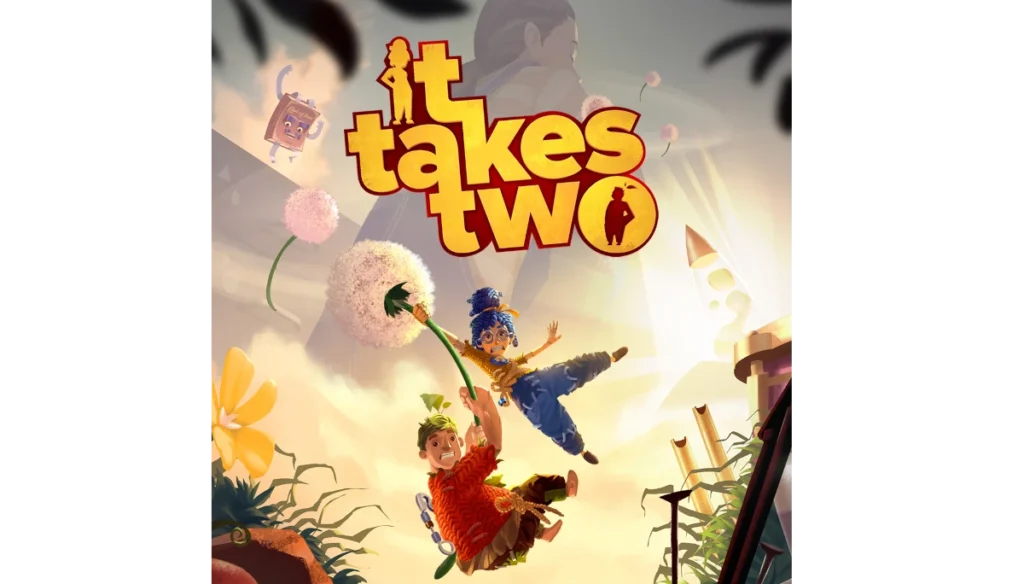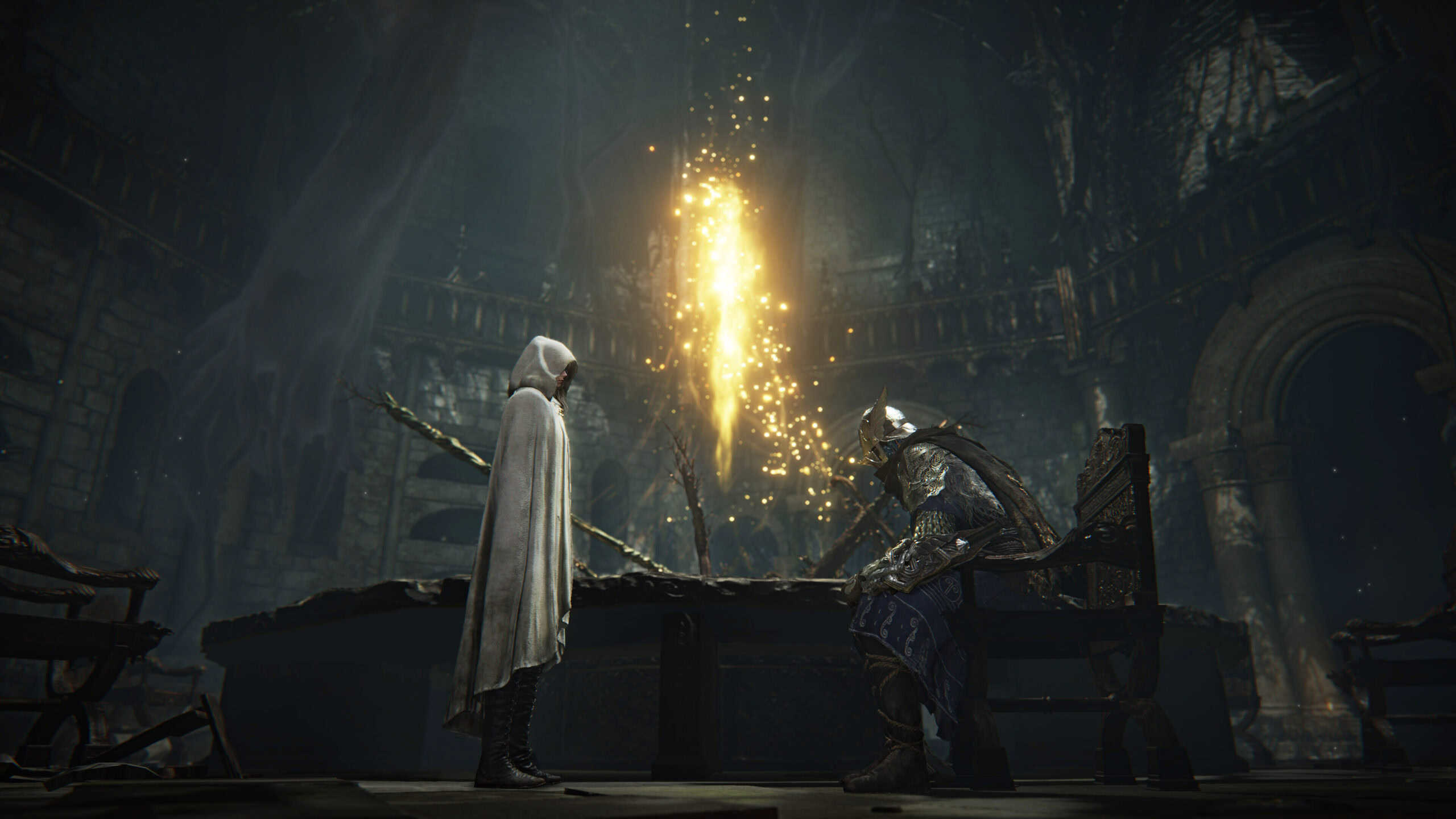FromSoftware’s latest title, Elden Ring: Nightreign, has officially launched as of May 30, 2025 — and it’s already shaking up the Soulslike formula with a bold mix of co-op gameplay, roguelike design, and an accelerated pace that has left fans equally thrilled and bewildered.

So far the game has been a huge commercial success right out of the gate with over 2 million copies sold on the first day and surging to over 300,000 active players on Steam:
A New Direction For The Elden Ring Universe
Set in the grim, procedurally generated land of Limveld, Nightreign trades in the open-ended exploration of Elden Ring for a tight, three-day structure of escalating danger and rising tension. Players take on the role of “Nightfarers” — powerful but mortal adventurers who must survive a cycle of combat, loot runs, and boss fights before facing the mighty Nightlords.
Each run is a race against time, quite literally. A dark fog encroaches on the map, forcing players to constantly move, plan, and adapt. For some, this mechanic feels like a refreshing challenge. One player described it as “speedrunning with purpose — it’s brutally fast, but thrilling once you get the rhythm.” Others feel it undercuts the series’ hallmark: deliberate exploration. “It feels more arcade than Souls,” one player said, lamenting the pressure to rush instead of soak in the world.
Launch Performance and Player Reaction
Nightreign peaked at over 313,000 concurrent players on Steam at launch, making it FromSoftware’s second-largest PC debut after Elden Ring. However, Steam reviews have landed in the Mixed range, with praise for the combat design and cooperative intensity counterbalanced by frustration over technical hiccups and some design omissions.
On Metacritic, it currently sits at 78 for PS5 and 81 for PC, reflecting a similarly polarized reception. Critics and players alike have cited the game’s lack of duo mode, no crossplay, and no in-game voice chat as baffling limitations for a title centered on team-based play. As one early player put it, “You need coordination to survive, but the game doesn’t give you the tools to actually coordinate.”
Still, for others, the fun lies in the chaos: “I carried two strangers through the final boss last night — the most satisfying thing I’ve done in a Souls game in years.”
Co-op Gameplay and Class Variety
Gameplay revolves around three-player expeditions, with players choosing from eight distinct classes. Early fan favorites include:
- Duchess, a versatile spellblade with strong support potential.
- Wylder, considered by many the most “complete” starter pick with solid all-around abilities.
- Revenant, the new necromancer-like class that can grant temporary immortality and revive fallen allies. The edgy trailer for Revenant — featuring Evanescence’s “Bring Me to Life” — certainly didn’t hurt its popularity.
Each class brings its own quirks. Some players felt characters like Raider lacked the stamina to use their own weapons effectively, while others noted how Ironeye shines despite poor gear drops. The class meta is still evolving — a common refrain from players is that the early hours can feel unbalanced or unrewarding until you learn the map’s loot paths and enemy patterns.
The Solo Player Dilemma
FromSoftware has acknowledged that solo play was underbaked at launch, with the director admitting the team focused too heavily on three-player design. A patch scheduled for next week (1.02) aims to improve the experience by increasing rune rewards and adding a one-time auto-revive mechanic for solo players during Nightlord fights.
The good news? Some players are already finding solo more viable than expected. “Once you learn the systems and map,” one player noted, “going solo becomes surprisingly enjoyable — maybe even easier than playing with bad randoms.”
Others, however, remain skeptical. “Solo feels almost unplayable,” one wrote. “You’re underleveled, undergeared, and the wall of fog doesn’t care.”
Technical Issues and Launch Patch
While Nightreign runs relatively well on consoles, PC performance has been a major sticking point, especially for users with high-end rigs. Reports of frame rate drops, input lag, and even multi-second freezes are widespread. FromSoftware has recommended players lower graphics settings until optimization improves. The Day 1 patch (1.01) addressed some bugs and added balance tweaks, but clearly, more refinement is needed.
Mixed Feelings on Replayability
The game’s roguelike progression, randomized loot, and rotating boss structure promise replayability — but some players worry it might not have the long-term legs of Elden Ring.
“The core gameplay is refreshing, but it gets repetitive,” one user wrote. “I’m not sure this will last more than a couple weeks unless they add new maps or relic systems.” Others compared the loot grind to Path of Exile or Risk of Rain 2, enjoying the build variation and high-stakes runs.
Twitch Integration and Community Tools
Twitch has gone all-in on Nightreign, launching a global death counter and unlockable badges for streamers. Unfortunately, while the game is meant to be streamed, the lack of proper communication tools in-game has hurt its cooperative appeal for some. “It’s just three people running in opposite directions, half the time,” one player joked.
Final Thoughts
Elden Ring: Nightreign is fast, brutal, and ambitious — a high-risk experiment from a studio known for slow, deliberate epics. For many, it’s an adrenaline rush unlike anything else in the genre. For others, it’s a chaotic departure from what they love about Souls games.
It’s clear that Nightreign isn’t meant to be Elden Ring 2. It’s something new, something divisive — and something that will likely evolve rapidly in the weeks ahead. Whether that evolution will satisfy skeptics or just deepen the divide remains to be seen.
As one player put it: “It’s fun, it’s frustrating, and I can’t stop playing — which means they probably nailed what they were going for.”
Game History: A Look Back At 2021
In December 2021, the gaming world celebrated its biggest achievements at The Game Awards, where “It Takes Two” claimed the prestigious Game of the Year title. This cooperative adventure game developed by Hazelight Studios and published by Electronic Arts not only won the top honor but also dominated the ceremony by taking home awards for Best Family Game and Best Multiplayer Game. The victory highlighted the gaming industry’s growing appreciation for innovative cooperative experiences that bring players together.

The 2021 Game Awards featured several other notable winners across various categories. Arkane Studios’ “Deathloop” received recognition for Best Game Direction, while “Marvel’s Guardians of the Galaxy” was celebrated for its exceptional narrative. These acknowledgments showcased the diverse range of gaming experiences that resonated with both critics and players throughout 2021.
In 2021, the video game industry experienced significant growth and transformation, driven by increased player engagement, major financial investments, and a diverse array of acclaimed titles.
🎮 Industry Overview
- Market Growth: The global video game market reached approximately $188.73 billion in 2021, reflecting a 1.4% increase from the previous year. This growth was fueled by the ongoing demand for interactive entertainment during the pandemic and the expansion of digital gaming platforms.
- Player Demographics: In the United States, nearly 227 million people played video games in 2021, with two-thirds of adults and three-quarters of children under 18 engaging in gaming weekly. The average age of a video game player was 31, and the player base was nearly evenly split between males and females.
- Investment Surge: The year marked a record for gaming industry deal-making, with over 1,100 acquisitions and investments totaling $85 billion. This surge highlighted the industry’s robust growth and attractiveness to investors.
🏆 The Game Awards 2021 Highlights
The Game Awards 2021 celebrated the year’s outstanding games and developers. Key winners included:
- Game of the Year: It Takes Two – Hazelight Studios / Electronic Arts
- Best Game Direction: Deathloop – Arkane Studios / Bethesda
- Best Narrative: Marvel’s Guardians of the Galaxy – Eidos Montreal / Square Enix
- Best Art Direction: Deathloop – Arkane Studios / Bethesda
- Best Score and Music: Nier Replicant ver.1.22474487139 – Keiichi Okabe
- Best Audio Design: Forza Horizon 5 – Playground Games / Xbox Game Studios
- Best Performance: Maggie Robertson as Lady Dimitrescu – Resident Evil Village
- Games for Impact: Life is Strange: True Colors – Deck Nine / Square Enix
- Best Ongoing Game: Final Fantasy XIV Online – Square Enix
- Best Independent Game: Kena: Bridge of Spirits – Ember Lab
- Best Mobile Game: Genshin Impact – miHoYo
- Best VR/AR Game: Resident Evil 4 VR – Armature Studio / Capcom / Oculus Studios
- Best Action Game: Returnal – Housemarque / Sony Interactive Entertainment
- Best Action/Adventure Game: Metroid Dread – MercurySteam / Nintendo
- Best Role Playing Game: Tales of Arise – Bandai Namco
- Best Fighting Game: Guilty Gear -Strive- – Arc System Works
- Best Family Game: It Takes Two – Hazelight Studios / Electronic Arts
- Best Sim/Strategy Game: Age of Empires IV – Relic Entertainment / Xbox Game Studios
- Best Sports/Racing Game: Forza Horizon 5 – Playground Games / Xbox Game Studios
- Best Multiplayer Game: It Takes Two – Hazelight Studios / Electronic Arts
- Content Creator of the Year: Dream
- Most Anticipated Game: Elden Ring – FromSoftware / Bandai Namco
These awards highlighted the industry’s creativity and the diverse gaming experiences that resonated with players worldwide .
📰 Notable Industry Developments
- Activision Blizzard Controversy: The company faced significant backlash following a lawsuit alleging a toxic workplace culture, leading to employee walkouts and increased scrutiny of industry practices.
- Microsoft’s Acquisition of Activision Blizzard: In January 2022, Microsoft announced its intent to acquire Activision Blizzard for $69 billion, aiming to bolster its gaming portfolio and expand its presence in the industry.
- Indie Game Recognition: Titles like Hades and Chicory: A Colorful Tale received critical acclaim, showcasing the growing impact and innovation of independent game developers.
Overall, 2021 was a transformative year for the gaming industry, marked by significant growth, groundbreaking games, and pivotal developments that continue to shape its future.
Key Takeaways
- “It Takes Two” dominated The Game Awards 2021, winning Game of the Year along with Best Family Game and Best Multiplayer Game categories.
- The 2021 awards recognized excellence across various genres, with “Deathloop” winning Best Game Direction and “Marvel’s Guardians of the Galaxy” taking Best Narrative.
- The Game Awards 2021 highlighted the industry’s shift toward innovative gameplay experiences that emphasize cooperation and storytelling.
Game of the Year 2021 Overview
The 2021 Game Awards celebrated outstanding achievements in video gaming, with “It Takes Two” claiming the prestigious Game of the Year title. The awards highlighted excellence across multiple gaming categories while recognizing innovative storytelling and technical achievements.
Award Winners and Nominees
“It Takes Two,” developed by Hazelight Studios and published by EA, took home the highest honor at The Game Awards 2021. This cooperative action-adventure game beat out other notable nominees including “Deathloop,” “Resident Evil Village,” and “Metroid Dread.”
“Deathloop,” created by Arkane Studios, won Best Game Direction for its innovative time-loop gameplay mechanics. The game received significant recognition for its unique approach to storytelling and level design.
“Marvel’s Guardians of the Galaxy” claimed the Best Narrative award, showcasing the industry’s appreciation for well-crafted storylines. The title impressed judges with its character development and engaging dialogue.
Standout Categories
Beyond the main awards, several specialized categories highlighted gaming excellence. The Best Indie category celebrated smaller studios creating impressive experiences with limited resources.
The Best Performance category recognized outstanding voice and motion capture work that brought digital characters to life. These performances helped create memorable moments throughout 2021’s gaming landscape.
Best Multiplayer honored games that excelled in creating engaging social experiences. “It Takes Two” stood out in this category as well, reinforcing its overall dominance at the ceremony.
Best Action recognized games with exceptional combat mechanics and thrilling gameplay sequences. The category featured titles with responsive controls and engaging moment-to-moment action that kept players on the edge of their seats.
Impact on Industry and Future Titles
The Game Awards 2021 marked a significant shift in game development trends and player expectations. Multiple winning titles showcased innovations that would influence future game design, while community engagement took center stage in recognition and ongoing support.
Advancements in Game Development
The 2021 awards highlighted remarkable technical achievements that shaped future development directions. The Matrix Awakens: An Unreal Engine 5 Experience demonstrated the powerful capabilities of the new engine, setting a high bar for visual fidelity and immersion. This tech demo blurred the line between cinema and interactive media, giving developers a glimpse of what was possible.
It Takes Two, which won Game of the Year, proved that innovative cooperative gameplay could compete with traditional single-player experiences. Its success encouraged developers to reimagine multiplayer interactions beyond competitive formats.
Accessibility innovations received increased recognition, with more titles implementing features to accommodate diverse player needs. This trend reflected the industry’s growing commitment to inclusive design principles.
Community and Critical Reception
Final Fantasy XIV’s Best Ongoing Game award celebrated its remarkable community support and developer responsiveness. The game’s continued success demonstrated the value of listening to player feedback and consistently delivering quality content updates.
Genshin Impact winning Best Mobile Game confirmed that mobile platforms could support premium gaming experiences with dedicated communities. This shifted industry perceptions about mobile gaming’s potential and market value.
Most Anticipated Game nominees, particularly Elden Ring, generated unprecedented community excitement. The enthusiastic reception showed how player anticipation could build powerful momentum for upcoming titles.
Games for Impact category highlighted how interactive media increasingly addressed meaningful social themes. Life is Strange: True Colors’ win affirmed that emotionally resonant storytelling remained a valued aspect of gaming experiences, even as technical capabilities advanced.
Frequently Asked Questions
The Game Awards 2021 celebrated outstanding achievements in gaming with “It Takes Two” taking home the top prize. The event featured exciting announcements and honored various games across multiple categories.
Which titles were nominated for the 2021 Game of the Year?
The 2021 Game of the Year nominees included “It Takes Two,” “Deathloop,” “Psychonauts 2,” “Metroid Dread,” “Resident Evil Village,” and “Ratchet & Clank: Rift Apart.” These titles represented diverse genres and gaming experiences.
Each nominee showcased exceptional quality in different aspects of game design, from storytelling to technical innovation.
“It Takes Two,” developed by Hazelight Studios and published by Electronic Arts, ultimately won the prestigious award.
What criteria were used to select the Game of the Year for 2021?
The Game Awards uses a blended voting system that combines input from an international jury of gaming media outlets and public fan votes. The jury vote counts for 90% of the final result, while fan votes make up the remaining 10%.
Games are evaluated based on technical achievement, gameplay innovation, narrative excellence, and overall impact on the gaming landscape. Creative direction and artistic merit also play significant roles in the selection process.
Nominees must have been released between a specific timeframe to qualify for the 2021 awards.
How does the 2021 Game of the Year winner compare to previous years’ winners?
“It Takes Two” stands out as the first purely cooperative game to win Game of the Year. Unlike previous winners that often featured single-player experiences or competitive multiplayer modes, it required two players working together throughout the entire adventure.
Previous winners like “The Last of Us Part II” (2020) and “Sekiro: Shadows Die Twice” (2019) were primarily single-player experiences with strong narrative or gameplay focus.
“It Takes Two” also represents a shift toward recognizing innovative gameplay mechanics rather than just technical prowess or storytelling excellence.
Are there any repeat winners or developers from past Game of the Year awards in the 2021 line-up?
None of the studios nominated for Game of the Year in 2021 had previously won the top prize. Hazelight Studios, led by Josef Fares, had gained recognition with “A Way Out” but had never won Game of the Year before “It Takes Two.”
Several nominated studios had received other category awards in previous years. Arkane Studios (nominated for “Deathloop”) had previously won design and artistic achievement awards.
Publisher Electronic Arts had previously published other Game of the Year winners, but “It Takes Two” represented a different style of game than their typical offerings.
What impact did the 2021 Game of the Year have on the gaming industry?
“It Takes Two” highlighted the growing importance of cooperative gameplay experiences in an industry often focused on competitive multiplayer or single-player narratives. Its success encouraged more developers to explore split-screen and shared-screen cooperative mechanics.
The game demonstrated that mid-budget titles with creative gameplay could compete against large-scale AAA productions. This inspired indie and mid-tier studios to pursue innovative design concepts.
The success also elevated Josef Fares and Hazelight Studios to greater prominence within the industry, validating their focus on purely cooperative experiences.
What innovations did the 2021 Game of the Year introduce that garnered critical acclaim?
“It Takes Two” received praise for seamlessly blending narrative and gameplay mechanics, with cooperative elements directly tied to the story of a struggling marriage. Each level introduced entirely new gameplay mechanics that players had to master together.
The game featured asymmetrical gameplay where each player controlled characters with different abilities that complemented each other. This forced genuine cooperation rather than simply having two players performing identical actions.
Critics appreciated how the game constantly surprised players with new mechanics and mini-games throughout its runtime, never allowing gameplay to become stale or repetitive.







